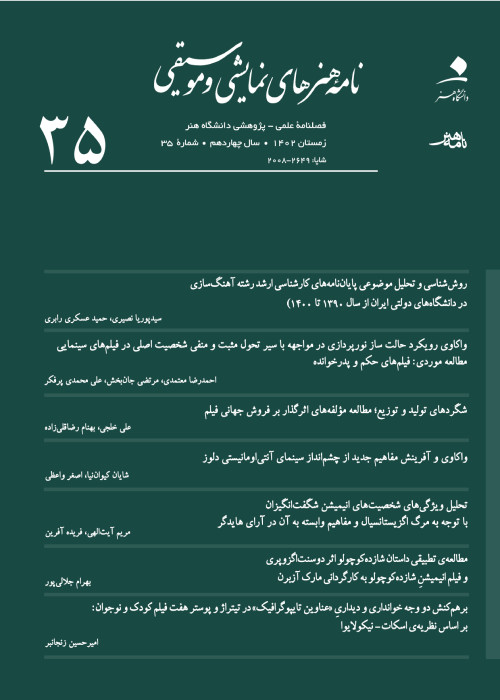A Research on Movie of "The Turin Horse" with an Intertextuality Approach (Creator & Reading Viewpoints)
Author(s):
Article Type:
Research/Original Article (دارای رتبه معتبر)
Abstract:
Cinema as a narrative medium has the human thoughts and concepts more than any media in the contemporary times; moreover, this medium has been influenced by other media such as literature, philosophy, politics, theater, visual arts, and so on due to its eclectic nature; in fact, the cinematic works are the texts that are affected by other text fields. Thus, an intertextuality approach can help identify the constructive pre-texts in the cinematic works well. An intertextuality theory states that any text has been created based on its previous texts. No text is produced or even received completely independently. The texts can appear through communications; as a result, each text has a sign of other texts in itself and a new text is created during these intertextual relationships. This theory was created by Julia Kristeva and was developed by the viewpoints of the thinkers such as Barthes, Genette, and Gifator. The Turin Horse focuses on a pair of impoverished potato farmers, father and daughter, and their horse (stated by the narrator, literally or metaphorically to be the same one seen by Nietzsche) living in a post-apocalyptic society in which a violent wind blows unremittingly. They live out an arduous and repetitive existence defined by nihilistic despair; they often take turns sitting by the window alone. The horse is increasingly uncooperative, refusing to leave the property or eat and drink. A neighbor visits to trade some goods; he claims the neighboring town has been destroyed and blames the apocalyptic scenario on both God and man. Later, a band of gypsies arrives and drains the farmers' well of water. The father decides they must abandon the farm; the two pack and depart with the horse behaving uncharacteristically well, but return home and unpack shortly after leaving for unspecified reasons. They remove the horse's reins and shut it in the barn. The world then plunges into absolute darkness; the two try lighting lamps but find they quickly extinguish, even the coals. The next day, the winds can no longer be heard inside the house. Now subsisting on raw potatoes, the daughter refuses to eat or talk, seemingly resigning to her fate. The father appears to follow, not finishing his potato and sitting with his daughter in silence. The movie "The Turin Horse", the latest work of Béla Tarr, Hungarian director, is an intertextual work that severely affects the viewers through its complex dimensions. This excellent and distinct movie in terms of the idea and form has been created under the influence of other texts. This paper tries to analyze the effective pre-texts in a cinematic outstanding work by the intertextuality approach. The present research, in which the data have been collected in terms of the analytical-descriptive research method based on an intertextuality approach and as a document, looks at one of the most distinctive contemporary cinematic works by the creator and reading viewpoints in the intertextuality field.
Keywords:
Language:
Persian
Published:
Journal of dramatic Arts and Music, Volume:12 Issue: 25, 2022
Pages:
43 to 62
magiran.com/p2455541
دانلود و مطالعه متن این مقاله با یکی از روشهای زیر امکان پذیر است:
اشتراک شخصی
با عضویت و پرداخت آنلاین حق اشتراک یکساله به مبلغ 1,390,000ريال میتوانید 70 عنوان مطلب دانلود کنید!
اشتراک سازمانی
به کتابخانه دانشگاه یا محل کار خود پیشنهاد کنید تا اشتراک سازمانی این پایگاه را برای دسترسی نامحدود همه کاربران به متن مطالب تهیه نمایند!
توجه!
- حق عضویت دریافتی صرف حمایت از نشریات عضو و نگهداری، تکمیل و توسعه مگیران میشود.
- پرداخت حق اشتراک و دانلود مقالات اجازه بازنشر آن در سایر رسانههای چاپی و دیجیتال را به کاربر نمیدهد.
دسترسی سراسری کاربران دانشگاه پیام نور!
اعضای هیئت علمی و دانشجویان دانشگاه پیام نور در سراسر کشور، در صورت ثبت نام با ایمیل دانشگاهی، تا پایان فروردین ماه 1403 به مقالات سایت دسترسی خواهند داشت!
In order to view content subscription is required
Personal subscription
Subscribe magiran.com for 70 € euros via PayPal and download 70 articles during a year.
Organization subscription
Please contact us to subscribe your university or library for unlimited access!



